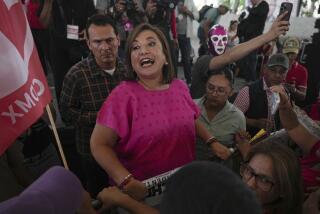Democracy First, Elections Later : Palestinians: Political legitimacy isn’t as important as building the civilian framework for a democratic state.
- Share via
Debate is escalating among Palestinians on the significance of holding elections for a governing body for the self-rule areas of the West Bank and Gaza Strip. These elections are called for in the secretly signed Oslo agreement between Israel and the Palestine Liberation Organization, but not in the later, formal Cairo agreement.
PLO officials consider such elections a vital lifeline for the Palestinian Authority led by Chairman Yasser Arafat and, thus, for the entire peace process with Israel. They specify two reasons for this view: Elections will expedite the withdrawal of Israeli troops from Palestinian-inhabited cities of the West Bank and will give the PLO political legitimacy. But do the Palestinians really need elections at this historical and extremely sensitive juncture, when their survival as an independent political entity is at stake? The answer is a definite no.
The right to vote and hold free elections is indeed noble; the right of citizens to choose their government is a tool for guaranteeing other rights in a democratic society. But elections per se are not an ultimate goal; democracy is.
Free elections bring tremendous responsibility that requires citizen awareness of the consequences of the choices made. If elections are to be truly free, then the electorate must also be free.
The Palestinians are not yet a free people, not only because of Israel’s continuing occupation of territory that is home to more than 1 million Palestinians in the West Bank, but also because they lack a fundamental requirement for free elections: a choice of political parties with media access to the electorate and clear agendas, platforms and vision that can evolve into legitimate civilian government.
The current organizations lack concrete economic or social plans, and the interim Palestinian Authority is burdened by poorly delineated power-sharing between civilian political figures, most of them long affiliated with the PLO, and veterans of Arafat’s military organization, Fatah.
The Palestinian police force in the self-rule areas, drawn largely from Fatah, is more like an armed militia than public servant, and its clear political bias will create problems during elections.
There are no Palestinian TV or radio stations; newspapers and magazines are the only media outlet for political campaigning and they are frequently confiscated by the police force or prevented from circulating in the self-rule areas.
Under such undemocratic practices, independent candidates would find it impossible to reach the people, thus circumventing democracy before its inception.
The Palestinians have a long way to go on the road to a democratic state, but they have started the journey in the right direction. They sincerely chose to enter into peace talks with Israel, agreeing on a limited self-rule formula for the West Bank and Gaza. Their freedom is now conditioned on the provisions of the Oslo and Cairo accords. By virtue of political necessity, Israeli security requirements and Palestinian internal affairs, these provisions are extremely restrictive. Insisting on elections under these circumstances will only add a new layer of limitations to the Palestinian Authority’s already circumscribed powers.
The period of Palestinian self-rule ought to be utilized for the creation of a democratic Palestinian society, rather than for testing Palestinian political legitimacy. I am not suggesting that the Palestinians should submit to a dictatorship or ignore the political, financial and administrative corruption among the senior ranks of PLO officials. On the contrary, a careful and rigorous investigation of alleged mishandling of power must be undertaken by local and international human-rights groups. But elections in non-democratic societies can be, and have been, widely manipulated to serve the agenda and interests of those in power.
The Palestinians should not focus foremost on their leaders’ need to establish political legitimacy. Rather, they should be concerned about their leaders’ abilities to transfer the Palestinian society from one that is based on nepotism and tribal relations to one in which democratic behavior is the norm, not the exception.
What is needed at present is the development of democratic Palestinian men and women through the establishment of democratic institutions based on limited--but free--elections. While such institutions currently exist--municipalities, chambers of commerce, labor unions, student councils, professional associations and so on--they are anything but democratic. These institutions, along with Palestinian universities and other national and international non-governmental organizations, must carry on a massive campaign to educate the Palestinian public about democracy and all that it entails. Thus, the very concept of free elections will be incrementally introduced to the Palestinians by individuals and institutions that practice the democracy they preach.
Rightly, the Palestinians are exceptionally sensitive to the “policy of appointment,” but they should distinguish between Palestinians who earned appointment and those who were appointed by Israeli authorities during the self-rule stage.
Many Palestinians see Yasser Arafat as a classic dictator, but they do not see him as a traitor. Though he may not be a canny philosopher, he is not a political blockhead, either. If the spread of Palestinian self-rule to the West Bank is being hindered because of disagreements over elections, Palestinians should let Arafat enjoy his absolute authority in the self-rule period to ensure that they reach the next stage--an independent democratic state.
More to Read
Sign up for Essential California
The most important California stories and recommendations in your inbox every morning.
You may occasionally receive promotional content from the Los Angeles Times.













